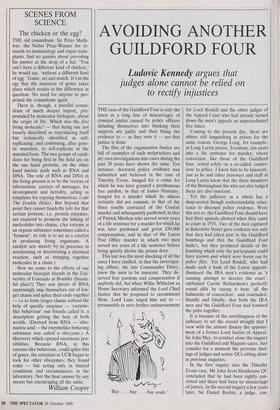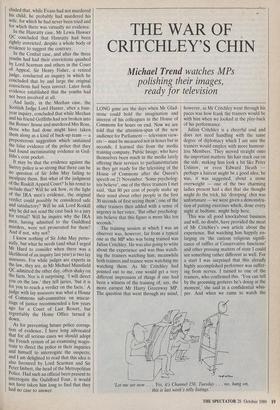AVOIDING ANOTHER GUILDFORD FOUR
Ludovic Kennedy argues that
judges alone cannot be relied on to rectify injustices
THE case of the Guildford Four is only the latest in a long line of miscarriages of criminal justice caused by police officers deluding themselves into thinking their suspects are guilty and then fixing the evidence to — as they view it — see that justice is done.
The files of the organisation Justice are full of examples of such malpractices and my own investigations into cases during the past 30 years have shown the same. F,or instance, doctored police evidence was submitted and believed in the case of Timothy Evans, hanged for a crime for which he was later granted a posthumous free pardon; in that of James Hanratty, hanged for a murder which he almost certainly did not commit; in that of the three youths convicted of the Confait murder and subsequently pardoned; in that of Patrick Meehan who served seven years of a life sentence for a murder for which he was later pardoned and given £50,000 compensation; and in that of the Luton Post Office murder in which two men served ten years of a life sentence before being quietly shown the prison door.
This last was the most shocking of all the cases I have studied, in that the investigat- ing officer, the late Commander Drury, knew the men to be innocent. They de- served free pardons and compensation if anybody did, but when Willie Whitelaw as Home Secretary informed the Lord Chief Justice that he proposed to recommend them, Lord Lane urged him not to presumably to save further embarrassment `Buy . . buy . . . buy souls.' for Lord Roskill and the other judges of the Appeal Court who had already turned down the men's appeals an unprecedented five times.
Coming to the present day, there are others still languishing in prison for the same reason; George Lqng, for example, at Long Lartin prison, Evesham, ten years into a life sentence for murder, whose conviction, like those of the Guildford four, rested solely on a so-called `confes- sion' to police. I know him to be innocent, just as he and other prisoners and staff at Long Lartin know that the three members of the Birmingham Six who are also lodged there are also innocent.
Yet the judiciary as a whole has a deep-seated though understandable reluc- tance to discount police evidence, Were this not so, the Guildford Four should have had their appeals allowed when they came to court in 1976. Two of the men captured in Balcombe Street gave evidence not only that they had taken part in the Guildford bombings and that the Guildford Four hadn't, but they produced details of the bombing which only the participants could have known and which were borne 'out by police files. Yet Lord Roskill, who had made such a hash of the Luton appeals, dismissed the IRA men's evidence as 'a cunning attempt to deceive the court', rubbished Carole Richardson's perfectly sound alibi by saying it bore 'all the hallmarks of concoction', and concluded, blandly and blindly, that both the IRA men and the Guildford Four had bombed the pubs together.
It is because of the unwillingness of the judiciary to set the record straight that I view with the utmost dismay the appoint- ment of a former Lord Justice of Appeal, Sir John May, to conduct alone the inquiry into the Guildford and Maguire cases. Just consider for a moment the perverse find- ings of judges and senior QCs sitting alone in previous inquiries.
In the first inquiry into the Timothy Evans case, Mr John Scott Henderson QC concluded that he had been rightly con- victed and there had been no miscarriage of justice. In the second inquiry a few years later, Sir Daniel Brabin, a judge, con- eluded that, while Evans had not murdered his child, he probably had murdered his wife, for which he had never been tried and for which there was virtually no evidence. In the Hanratty case, Mr Lewis Hawser QC concluded that Hanratty had been rightly convicted, despite a whole body of evidence to suggest the contrary. In the Confait case, and after the three youths had had their convictions quashed by Lord Scarman and others in the Court of Appeal, Sir Henry Fisher, a retired Judge, conducted an inquiry in which he concluded that by and large the original convictions had been correct. Later fresh evidence established that the youths had not been involved at all.
And lastly, in the Meehan case, the Scottish Judge Lord Hunter, after a four- year inquiry, concluded that while Meehan and his friend Griffiths had not broken into the Rosses' house and murdered Mrs Ross, those who had done might have taken them along as a kind of back-up team — a preposterous suggestion which sustained the false evidence of the police that they had found incriminating evidence in Grif- fiths's coat pocket. It may be that the evidence against the Surrey police is so strong that there can be no question of Sir John May failing to inculpate them. But what of the judgment of the Roskill Appeal Court? Is his remit to include that? Will he ask how, in the light of the IRA men's evidence, the original verdict could possibly be considered safe and satisfactory? Will he ask Lord Roskill why he did not send the case back to a jury for retrial? Will he inquire why the IRA men, having admitted to the Guildford murders, were not prosecuted for them? And if not, why not? I know nothing of Sir John May perso- nally, but what he needs (and what I urged Mr Hurd to consider when there was a likelihood of an inquiry last year) is two lay assessors. For while judges are experts in the law, they are, as Mr Michael Mansfield QC admitted the other day, often shaky on the facts. Nor is it surprising. 'I will direct you on the law,' they tell juries, 'but it is for you to reach a verdict on the facts.' A Judge with lay assessors was what a House of Commons sub-committee on miscar- riage of justice recommended a few years ago for a Court of Last Resort, but regrettably the Home Office turned it down, As for preventing future police corrup- tion of evidence, I have long advocated that for all serious cases we should adopt the French system of an examining magis- trate to direct the police in their inquiries and himself to interrogate the suspects; and I am delighted to read that this idea is also favoured by Lord Scarman and Sir Peter Imbert, the head of the Metropolitan Police. Had such an official been present to Interrogate the Guildford Four, it would not have taken him long to find that they had no case to answer.



































































 Previous page
Previous page